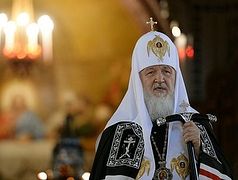Is it possible to forgive everyone for everything in one day, and what should we do if it doesn’t work? Fr. Konstantin Kobelev, the rector of the Church of the Protection of the Mother of God in Butyrka Prison in Moscow, discusses the stages in the process of offering forgiveness.
First stage: Don’t make any enemies
The most correct conduct with enemies is to not have any enemies at all. The first stage of achieving peace with those who offend you is to avoid situations where people become offenders. Enmity between people is most often caused by sin. Therefore, we must be attentive to ourselves, analyze our behavior, and not fall into emotionalism. If you feel an increase in tension in your relations with someone, in those moments try to be quieter, remain silent, be patient, and if possible, try to simply take a break from communication.
Second stage: In having a conflict, don’t let it get personal
But perhaps you did not have the strength to hold out on the first step, and a conflict breaks out. It should be noted that even the Lord Jesus Christ Himself had conflicts with people. At times it’s impossible to live on earth without conflict, preserving your views and beliefs and your soul. Sometimes there really are situations when we must openly stand for the truth, not fearing to confront evil.
But it’s necessary to separate the person from his actions and resist not the person, but his wrong actions. Condemn sin, but not the sinner. Sin itself does not need justification; it’s even dangerous: If we stop condemning sin, we could lose the understanding of the boundary between truth and falsehood.
Not condemning a person does not mean weakly allowing him to continue to do unseemly things.
Non-condemnation has nothing to do with appeasement. Moreover, in the case that someone persists in his sin, communication with him should be broken.
Third stage: Give the offender over to God
Then the conflict exhausts itself and a fracture appears in your relations with the person—an offense. We have a burning desire for revenge, whether overtly or covertly. At this stage, it’s more correct not to seek such opportunities, not to advocate “for justice”—but to entirely give your offender over into the hands of God. If he is worthy of punishment, let God punish him.
The punishment of the Lord is not so much a penalty for sin as it is an admonition. It’s no wonder the word “punishment” [in Russian] comes from the word “instruction.”[1]
Seeing as we ourselves are powerless to admonish our offender, we may well ask God to instruct him (not just pain and torment in retaliation!), and the Lord Himself will govern whatever is better, more beneficial, and more intelligible for him.
Fourth stage: Depart in peace
There is a common misconception: If relations have not been restored after a conflict, it means the people did not forgive one another. But that’s not exactly true.
A man can’t change and become someone else overnight. But we’re not required to continue the relationship with someone who offends us to no end. We mustn’t hold evil and offense against him within ourselves—but to drag out a friendship or other close relations is not necessary, and even harmful.
For example, if a husband continually cheats on his wife, then she, having inwardly forgiven the cheater, is allowed to leave such a husband to save herself from destruction.
We cannot condone sin, and when it is compounded more and more, it could lead to a real tragedy. For example, if a wife endlessly forgives her husband’s assaults and stays with him and he doesn’t start to change his behavior, then it could end with the husband in jail and the wife in the grave.
Therefore, there is no need to forcefully make “friends” with someone who continually offends us. Forgive and walk away.
Sometimes there are situations in the parish when some of the parishioners don’t get along, although both are wonderful people, but there’s some kind of misunderstanding… So what to do? It doesn’t always work out to be friends with everyone. It would be ideal, but people don’t live up to the ideal.
In such instances, priests advise: Don’t try to force a relationship—ask forgiveness of one another and then keep a distance from one another. It doesn’t matter who’s right and who’s to blame. It’s better to avoid sin in advance than to impose upon one another and be tempted.
But how can we feel this internal forgiveness? Try to mentally give the offender into the hands of God. But this is by no means about the malevolent expectation of human suffering. Even when we feel everything inside seething and hurting, even when we’re not in a state to forgive personally, we should ask God’s forgiveness for the one who offended us. That is the best and highest on the path of forgiveness—when we sincerely want the Lord to be merciful to those who have offended us.
Therefore, on Forgiveness Sunday we say: “God will forgive.” That means that in eternal life, in the Heavenly Kingdom, we wish for this man to be forgiven by God.
Fifth stage: If your anger does not pass, forget about your enemy
Sometimes time passes and we simply can’t forget our pain and forgive our offender. Our enmity has become chronic. At this stage, it’s most correct to try to sincerely forget your enemy—stop thinking about him.
Imagine you’re racing along in a car on a straight, smooth road, and you suddenly decide to abruptly turn back. If you just suddenly shift into reverse at full speed, you not only won’t go in reverse, but you will destroy your car. First you need to brake, stop, and only then reverse and go in the opposite direction.
This is the way to brake and stop—and this is the path from anger and hatred to forgiveness and peace. We absolutely must calm down and even go through a certain stage of indifference towards our offender.
The ability to forgive is not just given—we must develop it within ourselves.
And not least is the ability to look at this person more broadly than we are used to. After all, when we classify someone as an enemy, then we see only one side of them, which irritates and offends us. We could even equate the person, with all his diversity, with just one of his actions. But people are more complicated than that!
We must understand that the evil a man does is not reflective of his entire essence.
And the most important skill is the ability to see something good in everyone. After all, that is how God forgives us—behind our multitude of sins, he sees a good beginning in everyone.
Sixth stage: Pray for our enemies
The next stage of deliverance from the sin of enmity is prayer. Of course, it should also be present at all the previous stages. At the first stage we pray to God, asking Him to protect us from evil. And during the conflict it would be good not to answer the other person irascibly, but with prayer in the heart.
However, in the previous stages, prayer is a means, but at this stage it becomes the goal. It is precisely prayer for people that is the greatest good, the most important way we can manifest love.
In fact, it is difficult to forgive sincerely. We must recognize this in ourselves and stop tormenting and abusing our souls, demanding from them that which is unbearable.
But a prayer for someone, where we wish him peace despite our “I don’t want to, I can’t forgive,” is within our capabilities.
Just don’t go looking everywhere for your old enemies in order to “test” yourself as to whether you’ve forgiven or not. First, it can ignite an old grudge, and second, it can lead to an even worse sin: to pride. Look at me—I forgive everyone.
To protect ourselves from this, the Lord could not give us a sweet sense of forgiveness. But we must do what we are able: to not desire evil and to sincerely wish God’s forgiveness of our enemy. It’s enough to even mentally say: “God will forgive.”
Seventh stage: Turn away from evil and do good
This may come as a surprise, but an enemy is in need of our good deeds even more than a friend. Of course, we must help our friends, we must support them … but our friends love us. If we lend to those from whom we expect something in return, what gratitude is there in that?
Doing good for our enemies has great significance both for our own souls and for relations with our offender. Such behavior from us could serve as an impetus for him to reconcile with us and forgive us. After all, enmity is a double-edged sword, and on its other side is the same person, the same offense that needs to be healed.





